Psst... Did you hear that? It's the sound of anticipation in our upcoming events section. Stay tuned for a flurry of exciting happenings that will fill this empty space with knowledge, connections, and unforgettable experiences.
Join us for an enriching evening of insights and networking at our exclusive speaker series on October 3rd, featuring distinguished speakers, Appana Lok and James Des Cotes from RV Anderson. With a wealth of experience and expertise in the field, they bring a unique perspective on the latest trends and innovations in urban planning and infrastructure development. From 4:30 PM to 6:30 PM, immerse yourself in engaging discussions that promise to inspire and inform. Following the enlightening talks, seize the opportunity to connect and collaborate during our networking event. Don't miss this chance to learn from industry leaders and expand your professional network. Visit RV Anderson's About Page to learn more about their exceptional contributions to the industry. Secure your spot now for an evening that promises to be both informative and enriching!
Register Here: https://forms.office.com/r/9xfFS3RH34
Date: October 3rd 2023
Time: 4:30 pm to 6:30 pm
Location: 280N York Lanes
About RV Anderson:
RV Anderson is a distinguished consulting engineering and planning firm committed to creating resilient and sustainable communities. With a rich history dating back to 1948, RV Anderson has been at the forefront of innovation, working on projects that shape the urban landscapes we inhabit today. Their team of dedicated professionals combines expertise in engineering, planning, and environmental sustainability to deliver solutions that transcend conventional approaches.
Appana Lok
Appana Lok obtained her Bachelor of Science in Environmental Chemistry in 2014 and Master of Applied Science in Civil Engineering in 2017 from the University of Toronto (U of T). She has been an active member of OWWA and has served as the U of T OWWA Student Chapter President (2015-2016) and OWWA Young Professional Chair (2022-2023). Appana is a Process Engineer at R.V. Anderson Associates Limited with over 6 years of experience in studies, design, and contract administration of drinking water treatment systems.
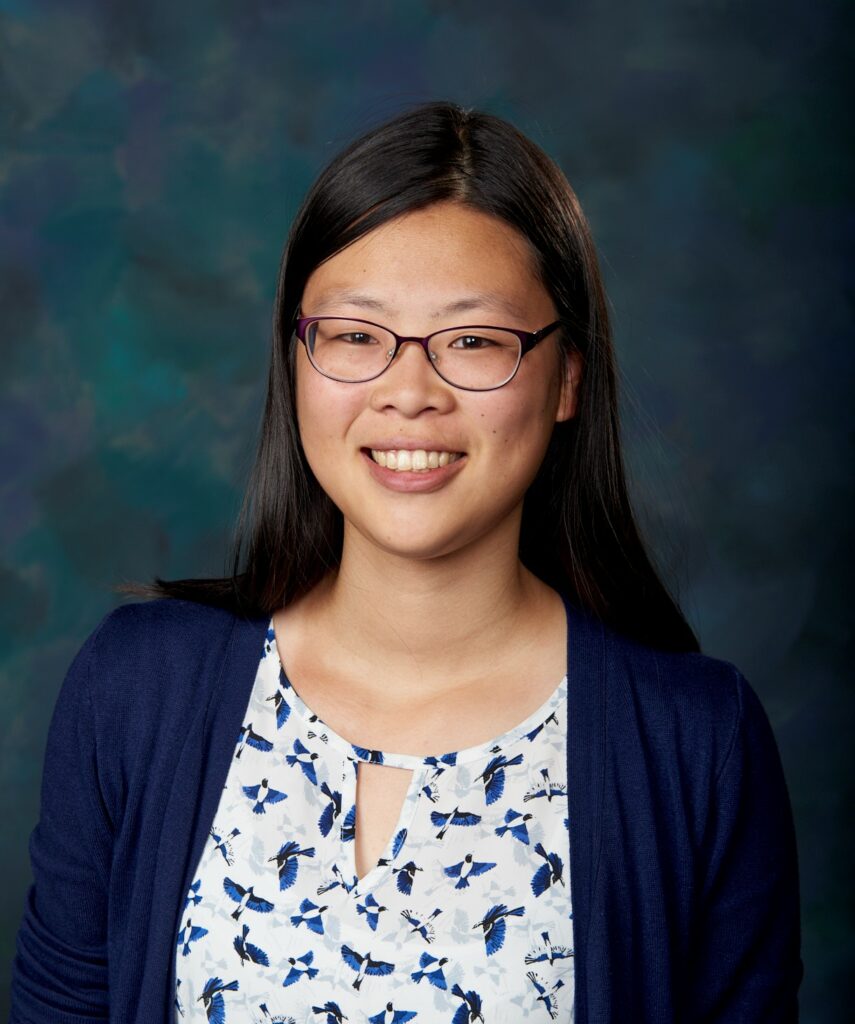
James Des Cotes
James graduated with a Bachelor of Applied Science in Chemical Engineering from the University of Waterloo in 2009. James joined R.V. Anderson Associates Limited shortly thereafter where he began his career as a site inspector on a wastewater treatment plant site. Nearly 15 years later James is now a Principal and Process Engineer of the firm with experience gained through design work, site inspection, and contract administration for both water and wastewater treatment plants. James’s primary areas of focus are in biosolids treatment at wastewater plants and contract administration of construction projects to see the works designed by RVA implemented. James was a member of the WEAO YP group and is now a member of the Residuals and Biosolids Committee.
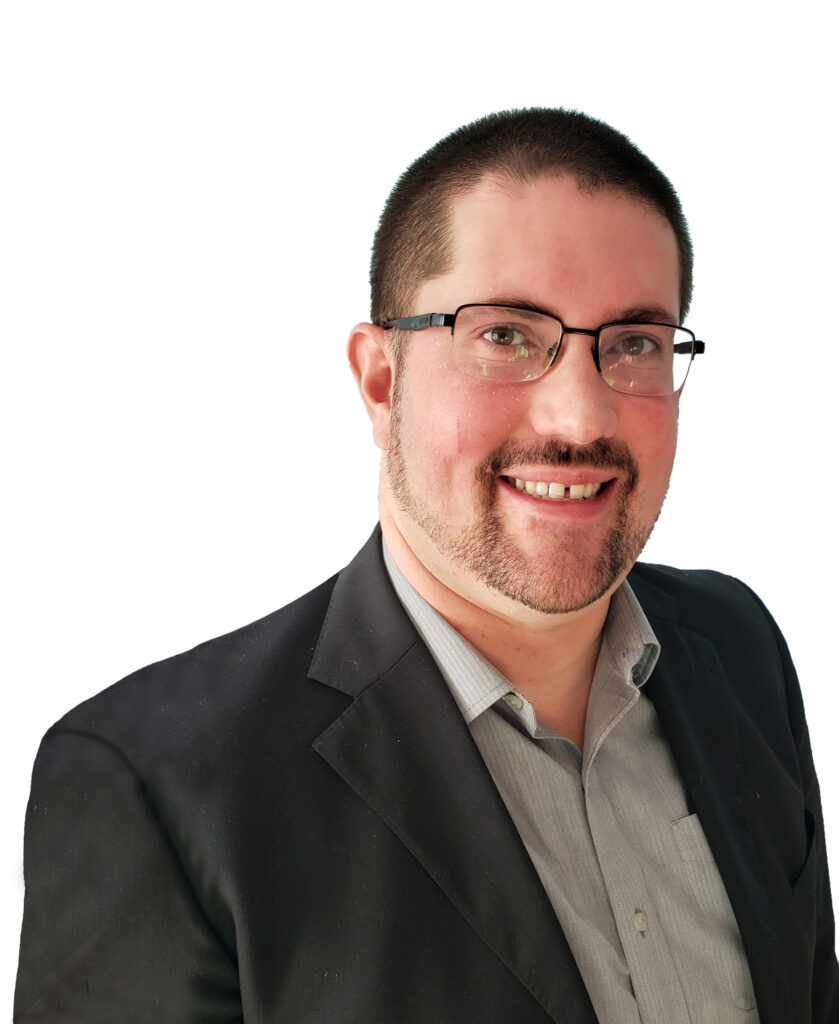
***Thank you for attending our webinar. Please stay tuned for the launch of the UN Global Water Academy website in the coming months with more panels, training modules, and workshops to come. Watch the recording (1:30:46)***
Join us on Friday, July 14, 2023, at 10 a.m. ET for a special event hosted by York University during the High-Level Political Forum on Sustainable Development with a panel entitled, “Humanitarian responses to emerging water crises as a result of extreme climatic events.”
Extreme climatic events, including heatwaves, droughts, and storms, are increasing in frequency and intensity over the past few decades, with consequences for freshwater. Extreme climatic events have been associated with changes in freshwater availability and degradation of water quality, including elevated concentrations of nutrients, contaminants of emerging concern, and potential for algal blooms, some of which may be toxic. As humans and wildlife rely on freshwater for life, alterations in the freshwater supply in response to extreme climatic events can have catastrophic impacts, particularly during humanitarian crises.
Bringing together four renowned experts who work at the heart of humanitarian solutions through technology, engineering, global governance, and advocacy, this virtual panel aims to explore the humanitarian responses, challenges, and solutions to alleviating the freshwater crisis, particularly in the face of global environmental degradation and extreme climatic events.
Register for the panel.
This event is cosponsored by the Dahdaleh Institute for Global Health Research; One WATER Research Centre; Office of the Vice-President Research & Innovation, York University; United Nations Development Programme; and United Nations Institute for Training and Research.
Please email sharma11@yorku.ca with any questions about this event.
Event Details:
- Date: June 15th
- Time: 10:00 am
- Location: York Lanes 280N
During this event, we will be sharing our experiences from the recent UN Water Conference, held in March 2023 in New York. It will be a great opportunity to gain insights into the current challenges and innovative solutions in the field of water security, climate change, and resilience. We are excited to showcase our research in the water field and exchange valuable knowledge with our community and partners.
The event is organized by Sapna Sharma (Science), Marina Freire-Gormaly (Lassonde), and Sylvie Morin (Science) in collaboration with the OneWATER Institute, Women & Inclusivity in Sustainable Energy Research (WISER), and CIFAL York.
Please feel free to use the following registration link to share with interested individuals. Be sure to register by June 10th: https://research.apps01.yorku.ca/machform/view.php?id=178059
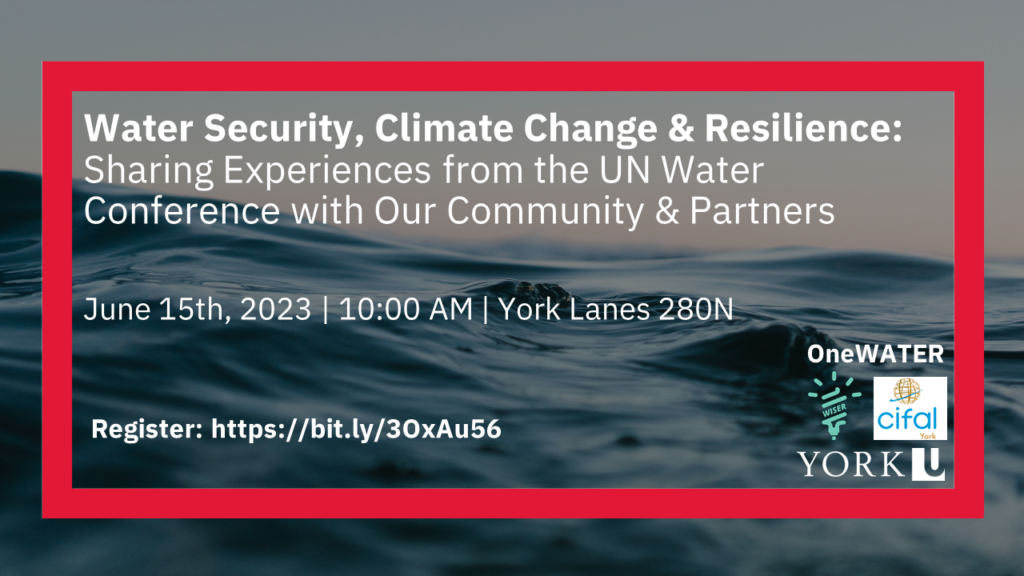
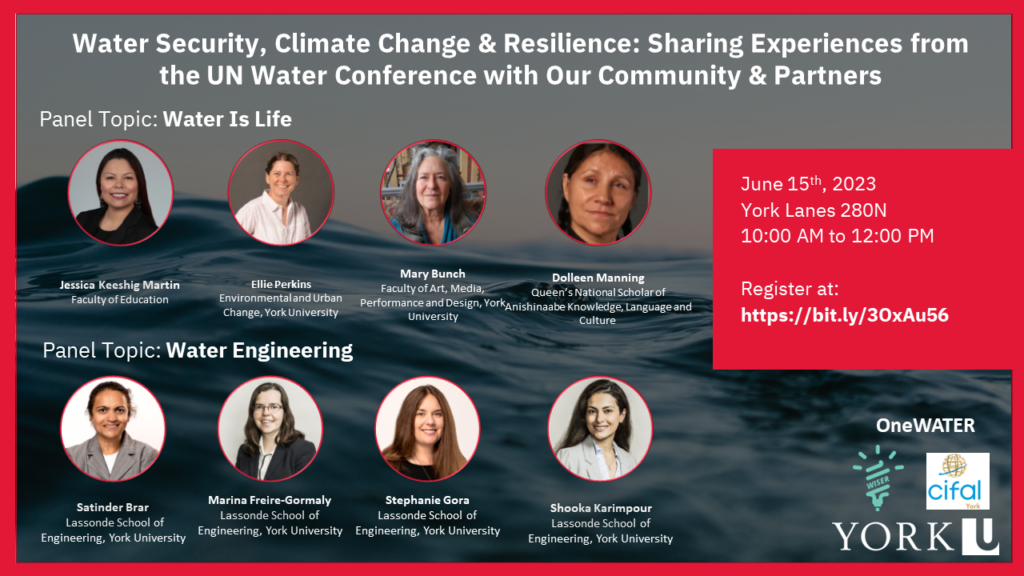
Event Agenda
Greeting
Introduction
Panels moderator: Sapna Sharma
Water is life
Panelists:
Jessica Keeshig Martin, Faculty of Education
Dolleen Manning, Queen’s University, Queen’s National Scholar of Anishinaabe Knowledge, Language and Culture
Mary Bunch, Faculty of Art, Media, Performance and Design, York University
Ellie Perkins, Environmental and Urban Change, York University
Water Engineering
Panelists:
Satinder Brar, Lassonde School of Engineering, York University
Marina Freire-Gormaly, Lassonde School of Engineering, York University
Stephanie Gora, Lassonde School of Engineering, York University
Shooka Karimpour, Lassonde School of Engineering, York University
The question period will be followed by a networking event for those interested
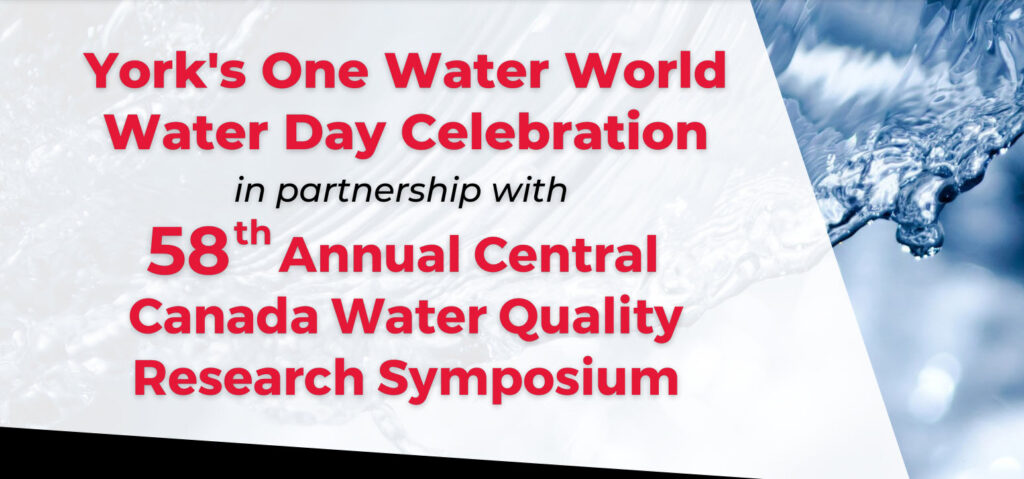
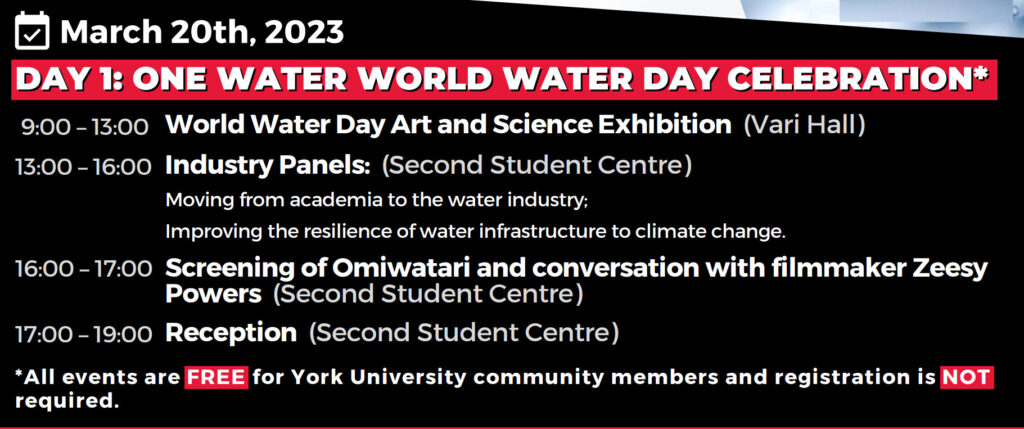
York University World Water Day Celebrations March 20th, 2023
World Water Day is an annual United Nations observance day held on 22 March that highlights the importance of fresh water. The day is used to advocate for the sustainable management of freshwater resources.
This year York University will celebrate World Water Day on March 20th as many community members are attending the UN Water Conference which will start on Water Day. One WATER Institute is grateful to its members for organizing and participating in these events to celebrate World Water Day.
Programs and Activities

1. Exhibition Presentations
World Water Day Art & Science Exhibition Presentations
Date & Time: March 20th 9am to 4pm
Location: Vari Hall Rotunda and Central Square.
Event Sponsors: Faculty of Science and YorkU Vice President Research and Innovation’s office.
Undergraduate students, graduate students and faculty members doing water related research at YorkU will be presenting their work and will engage with YorkU community. Please come meet with us!
Presentations & Exhibitions
| Names | Department | Title |
| Amanda Basu, Kevin Blagrave, Dawn Bazely, and Sapna Sharma | Biology | Phenological Shifts in lake ice across the Northern Hemisphere |
| Amanda J. Little and Jennifer B. Korosi | Geography | Ecological and biogeochemical dynamics at the onset of spring thaw in five arsenic-contaminated lakes near Yellowknife, NWT, Canada. |
| Damith Tennakoon, Alexandro Di Nunzio and Mojgan Jadidi | Lassonde | Terrain Analysis and Particle-Based Fluid Simulations using Immersive and Experiential Learning Environments |
| Arefeh Shamskhany and Shooka Karimpour | Lassonde | Instantaneous Transport Behaviour of Aquatic Microplastics |
| James Orbinski, Ali Asgary, Richard Matthew, Sosten Chiotha, Martin J Bunch, Mohammadali Tofighi, Jochen Schubert, Nilanjana Ganguli, Byomkesh Talukder, Patrick Likongwe, Vanessa van Schoor, Eunice Choi, and James Chirombo | Dahdaleh Institute for Global Health Research | Assessing the Impact of Climate Change on Health in the Chilwa Lake Basin: An Agent-Based Modelling Approach with Statistical Linkages between Climate and Disease Data |
| Ellie Perkins | EUC | Participatory research addressing water and climate challenges: seven global examples |
| Gaurav Bhardwaj, Juviya Mathew, Behnam Nayebi, Rama Pulicharla, and Satinder K. Brar | Lassonde | World Water Day: Tracing the Journey of Plastic to Microplastics in the environment |
| Gurpreet Kaur, Ginelle Aziz, Satyam Verma, and Satinder K. Brar | Lassonde | Potential of microbes towards decontamination of harmful pollutant in the subsurface |
| Jean Carlos Viccari Preira, Diego Alejandro Hernandez, Reema, AND Satinder K. Brar | Lassonde | Turning the Tide: Using enzymes to clean up oil spills from water |
| Kerrice Bailey, Kevin Blagrave, Aman Basu, Nadine Benoit, Todd Howell, Sapna Sharma | Biology | Spatial heterogeneity in water quality across the northern nearshore regions of the Laurentian Great Lakes |
| Kevin Blagrave, Luke Moslenko, Usman T Khan, Nadine Benoit, Todd Howell, Sapna Sharma | Biology | Heatwaves and Storms Contribute to Degraded Water Quality in Nearshore of Lake Ontario |
| Maryam Zarean, Raymond Kwong, and Satinder K. Brar | Biology | The co-occurrence and interaction of microplastics and antibiotic resistance in aquatic ecosystems: An emerging health threat |
| Noha Hasaneen, Pratishtha Khurana, Rama Pulicharla, Pouya Rezai, and Satinder K. Brar | Lassonde | ‘The Antibiotic Apocalypse’: Surrendering to superbugs? |
| Rachel Abulu | Geography | Impact of permafrost thaw on lake water quality |
| Rachel Pellegrino | EUC | What are diatoms, and why are they so special? |
| Rebecca Gasman | EUC | A Pan-Canadian Comparison of Cyanobacteria Bloom Management Policies, Programs, and Practices |
| Sejal Dave, Shooka Karimpour, and Raymond Kwong | Biology, Lassonde, and Biology | Evaluating the Bioaccumulation, Filtration Rates, and Elimination of Polyethylene Microspheres in Freshwater Water Fleas (Daphnia magna) and Zebra Mussels (Dreissena polymorpha) |
| Malihe Mohammadiun, Shooka Karimpour, Satinder K. Brar | Lassonde | Microplastics’ Biofouling Facilitated by Wastewater Effluent |

2. Panel
Moving from academia to the water industry; improving the resilience of water infrastructure to climate change
Date & Time: March 20th 1pm to 4pm
Location: Second Student Centre, Second Floor.
Organizer: Stephanie Gora for The International Water Association, Young water professional, Canadian Association of Water Quality and One WATER Institute.
Event sponsors: Lassonde School of Engineering, University of Toronto, Toronto Metropolitan University
Programs and Activities

1. Exhibition Presentations
World Water Day Art & Science Exhibition Presentations
Date & Time: March 20th 9am to 4pm
Location: Vari Hall Rotunda and Central Square.
Event Sponsors: Faculty of Science and YorkU Vice President Research and Innovation’s office.
Undergraduate students, graduate students and faculty members doing water related research at YorkU will be presenting their work and will engage with YorkU community. Please come meet with us!
Presentations & Exhibitions
| Names | Department | Title |
| Amanda Basu, Kevin Blagrave, Dawn Bazely, and Sapna Sharma | Biology | Phenological Shifts in lake ice across the Northern Hemisphere |
| Amanda J. Little and Jennifer B. Korosi | Geography | Ecological and biogeochemical dynamics at the onset of spring thaw in five arsenic-contaminated lakes near Yellowknife, NWT, Canada. |
| Damith Tennakoon, Alexandro Di Nunzio and Mojgan Jadidi | Lassonde | Terrain Analysis and Particle-Based Fluid Simulations using Immersive and Experiential Learning Environments |
| Arefeh Shamskhany and Shooka Karimpour | Lassonde | Instantaneous Transport Behaviour of Aquatic Microplastics |
| James Orbinski, Ali Asgary, Richard Matthew, Sosten Chiotha, Martin J Bunch, Mohammadali Tofighi, Jochen Schubert, Nilanjana Ganguli, Byomkesh Talukder, Patrick Likongwe, Vanessa van Schoor, Eunice Choi, and James Chirombo | Dahdaleh Institute for Global Health Research | Assessing the Impact of Climate Change on Health in the Chilwa Lake Basin: An Agent-Based Modelling Approach with Statistical Linkages between Climate and Disease Data |
| Ellie Perkins | EUC | Participatory research addressing water and climate challenges: seven global examples |
| Gaurav Bhardwaj, Juviya Mathew, Behnam Nayebi, Rama Pulicharla, and Satinder K. Brar | Lassonde | World Water Day: Tracing the Journey of Plastic to Microplastics in the environment |
| Gurpreet Kaur, Ginelle Aziz, Satyam Verma, and Satinder K. Brar | Lassonde | Potential of microbes towards decontamination of harmful pollutant in the subsurface |
| Jean Carlos Viccari Preira, Diego Alejandro Hernandez, Reema, AND Satinder K. Brar | Lassonde | Turning the Tide: Using enzymes to clean up oil spills from water |
| Kerrice Bailey, Kevin Blagrave, Aman Basu, Nadine Benoit, Todd Howell, Sapna Sharma | Biology | Spatial heterogeneity in water quality across the northern nearshore regions of the Laurentian Great Lakes |
| Kevin Blagrave, Luke Moslenko, Usman T Khan, Nadine Benoit, Todd Howell, Sapna Sharma | Biology | Heatwaves and Storms Contribute to Degraded Water Quality in Nearshore of Lake Ontario |
| Maryam Zarean, Raymond Kwong, and Satinder K. Brar | Biology | The co-occurrence and interaction of microplastics and antibiotic resistance in aquatic ecosystems: An emerging health threat |
| Noha Hasaneen, Pratishtha Khurana, Rama Pulicharla, Pouya Rezai, and Satinder K. Brar | Lassonde | ‘The Antibiotic Apocalypse’: Surrendering to superbugs? |
| Rachel Abulu | Geography | Impact of permafrost thaw on lake water quality |
| Rachel Pellegrino | EUC | What are diatoms, and why are they so special? |
| Rebecca Gasman | EUC | A Pan-Canadian Comparison of Cyanobacteria Bloom Management Policies, Programs, and Practices |
| Sejal Dave, Shooka Karimpour, and Raymond Kwong | Biology, Lassonde, and Biology | Evaluating the Bioaccumulation, Filtration Rates, and Elimination of Polyethylene Microspheres in Freshwater Water Fleas (Daphnia magna) and Zebra Mussels (Dreissena polymorpha) |
| Malihe Mohammadiun, Shooka Karimpour, Satinder K. Brar | Lassonde | Microplastics’ Biofouling Facilitated by Wastewater Effluent |

2. Panel
Moving from academia to the water industry; improving the resilience of water infrastructure to climate change
Date & Time: March 20th 1pm to 4pm
Location: Second Student Centre, Second Floor.
Organizer: Stephanie Gora for The International Water Association, Young water professional, Canadian Association of Water Quality and One WATER Institute.
Event sponsors: Lassonde School of Engineering, University of Toronto, Toronto Metropolitan University

3. Movie Screening
Omiwatari and Conversation with Film maker Zeesy Powers
Organizers: Sapna Sharma (One WATER Institute), Stephanie Gora (One WATER Institute) and Alicia Filipowich (Centre for Asian Studies)
Sponsors: Sharma Lab, Centre for Asian Studies, Lassonde School of Engineering, YorkU Vice President Research and Innovation’s office and One Water Institute
Followed by a reception March 20th 4pm to 6pm, Second Student Centre, second floor.
sdfcg
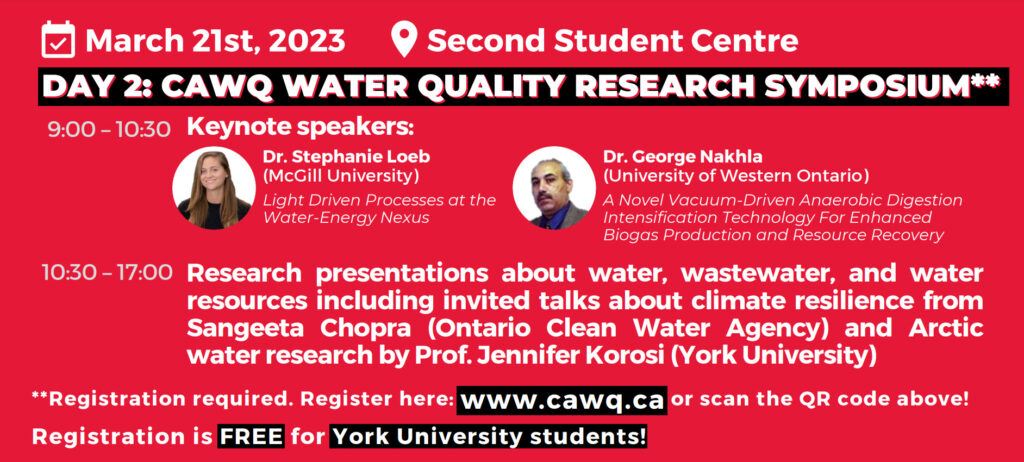
Day 2: March 21: Water Quality Research Symposium
For registration and more information please visit CAWQ website.
Organizers
Sponsors
Organizers
Sponsors

Lassonde School of Engineering, York University
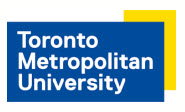
Toronto Metropolitan University

University of Toronto

York Centre for Asian Research

Sharma Lab
Event: Simulating Tsunami Dynamics: Investigating Breaking Surge Wave Dynamics and Structural Impacts through CFD Analysis
Details:
- Date: May 27, 2024
- Time: 11:00 AM - 12:30 PM
- Location: 314 York Lanes
Description:
Dr. Shooka Karimpour, an Assistant Professor of Civil Engineering at York University, presented a seminar on "Simulating Tsunami Dynamics: Investigating Breaking Surge Wave Dynamics and Structural Impacts through CFD Analysis." The seminar focused on surge waves, tsunami waves, and the effects of climate change on these extreme hydrodynamic events, using advanced computational models to assess impacts on coastal areas.
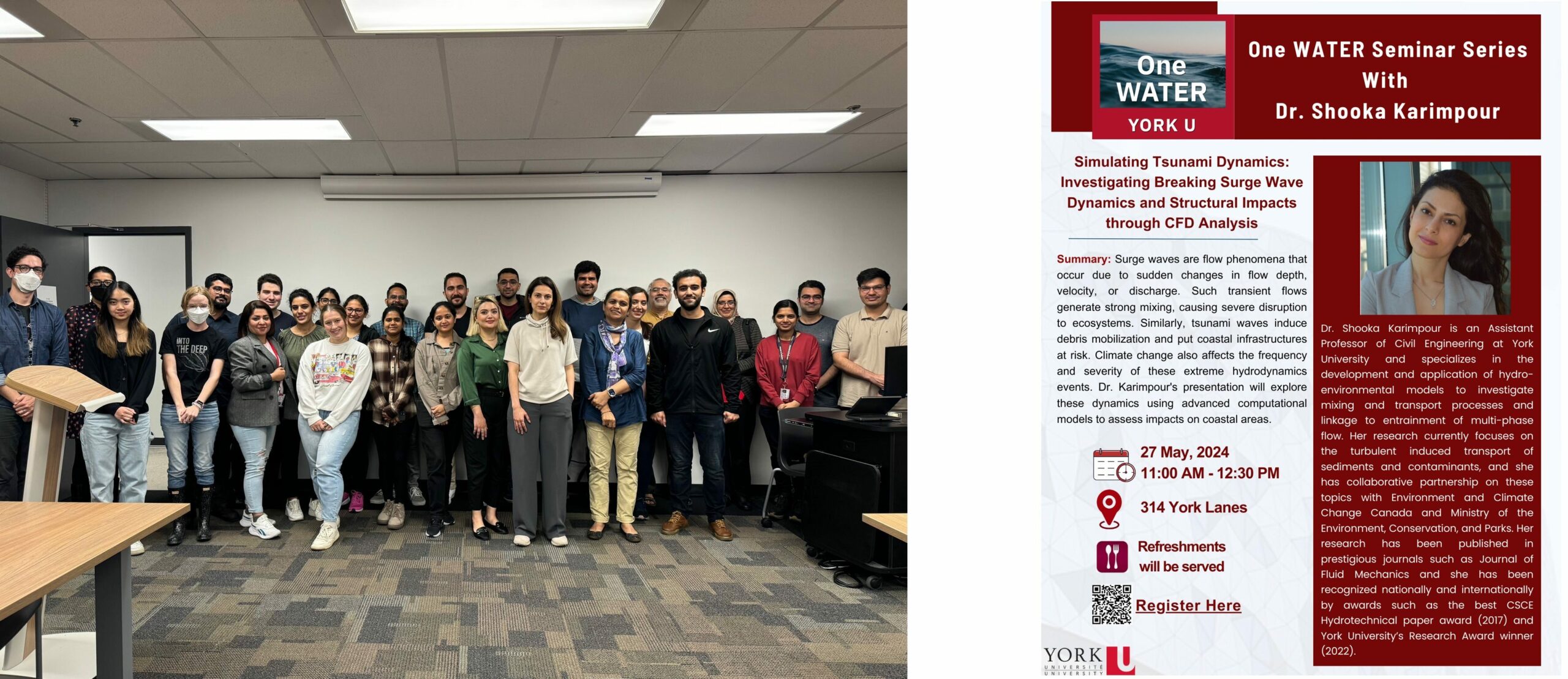
Learn more about coffee and get your questions answered over a cup of freshly brewed coffee!
Details:
- Date: May 30th, 2024
- Time: 12:00 PM - 1:00 PM
- Location: 306 Lumbers Building
Description:
Dr. Gilberto Vinícius de Melo Pereira, an Associate Professor at the Federal University of Paraná, Brazil, leads a research group studying fermentation processes in cocoa, coffee, kefir, alcoholic beverages, functional beverages, vinegar, and indigenous beverages. His work focuses on microbiome construction, microbial diversity, microorganism selection for biotech applications, probiotics, and fermentation process engineering.
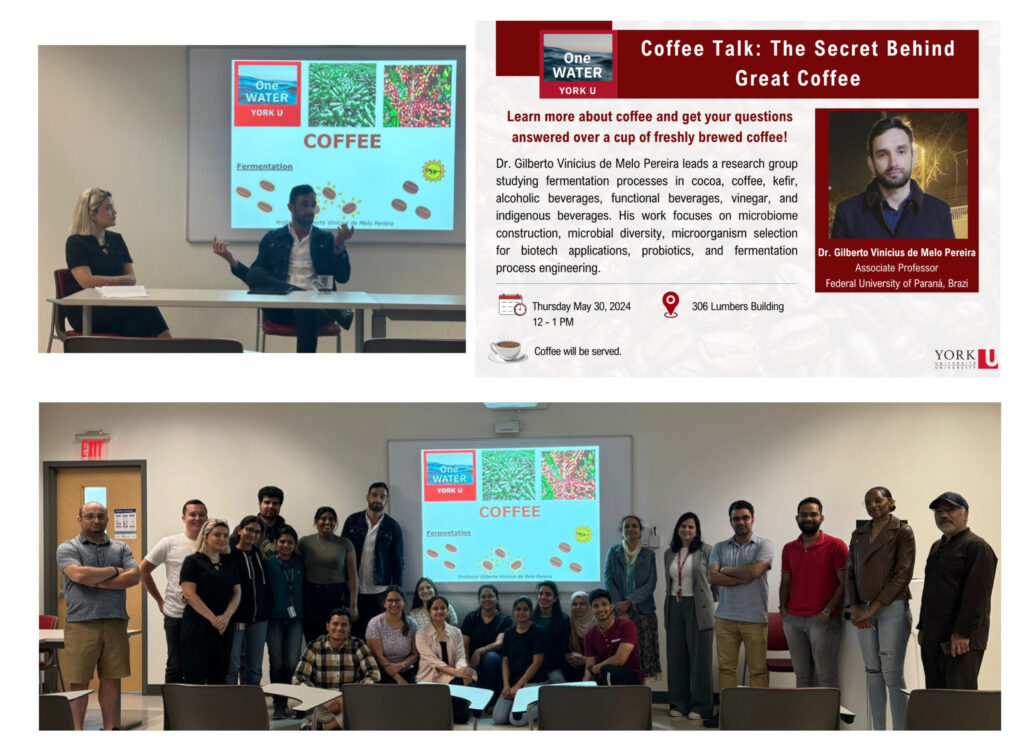
Panel Discussion for International World Water Day and World Environment Day
Event Details:
- Date: June 5th, 2024
- Time: 10:30 AM - 2:30 PM
- Location: LSB 103, York University
Panels:
Academic Panel:
- Convergence in Water: Technological Innovations, Water Quality, Health, and Pollution Control, Indigenous Perspectives on Water
Government, Industry & Not-for-profit Panel:
- All for Water & Water for All: Case Studies and Best Practices, Water Governance and Policy, Community Engagement and Equity, Urban Water Challenges and Solutions
Student Panel:
- Education and Awareness: Global Water Crisis, Understanding Water Scarcity, Canadian Water Landscape Overview
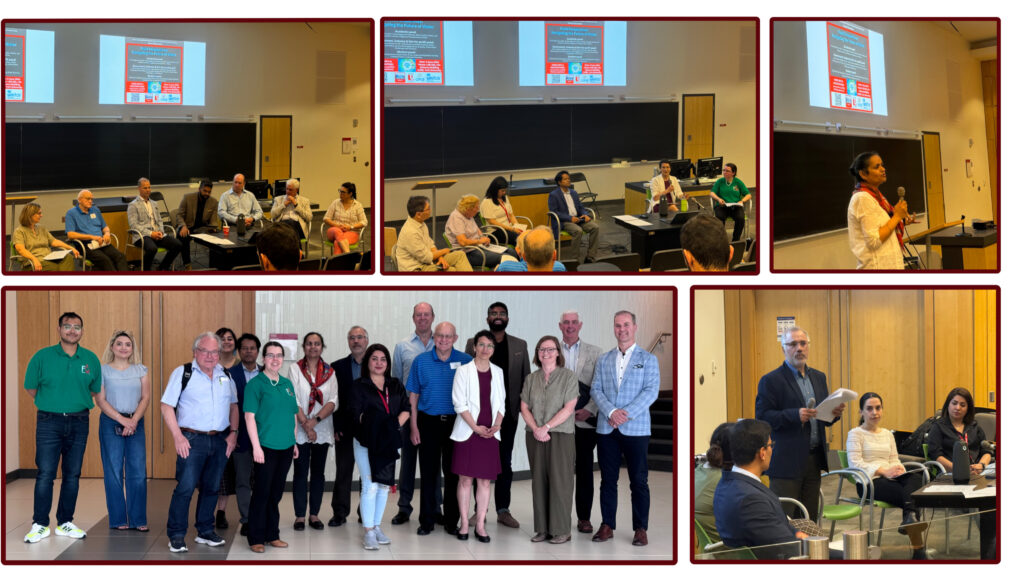
Details:
- Date: July 23, 2024
- Time: 9:30 AM - 12:00 PM
- Location: Stong College
Description: On July 23, 2024, we had the opportunity to partner with York University’s Science Engagement Programs to host a workshop for Grade 7/8 students focused on the environmental challenges posed by microplastics. The session was designed to be both informative and interactive, combining presentations with hands-on activities that allowed the students to explore and understand the impact of microplastics on our environment.
The students' enthusiasm and curiosity throughout the workshop highlighted the importance of engaging the younger generation in discussions about environmental sustainability and the role they can play in addressing these issues.
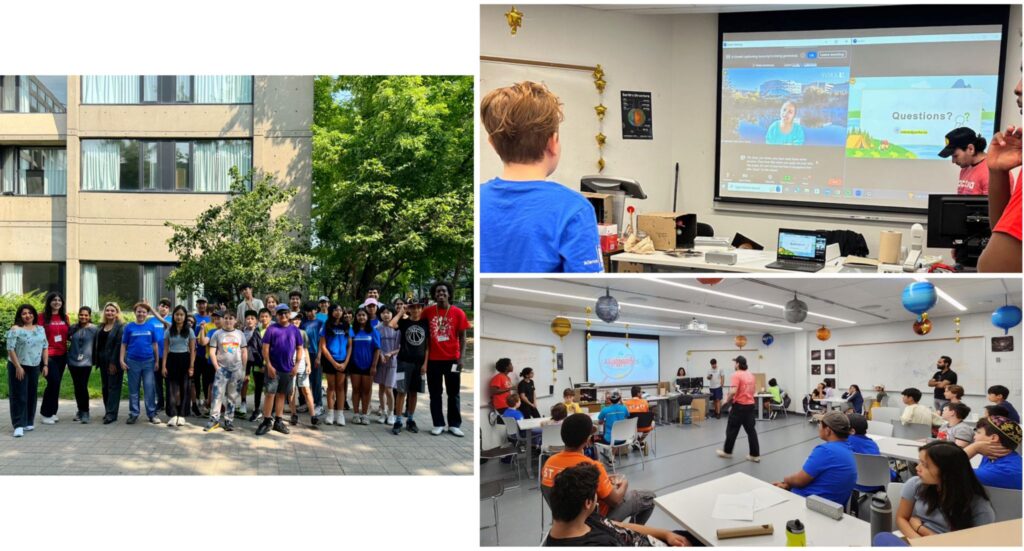
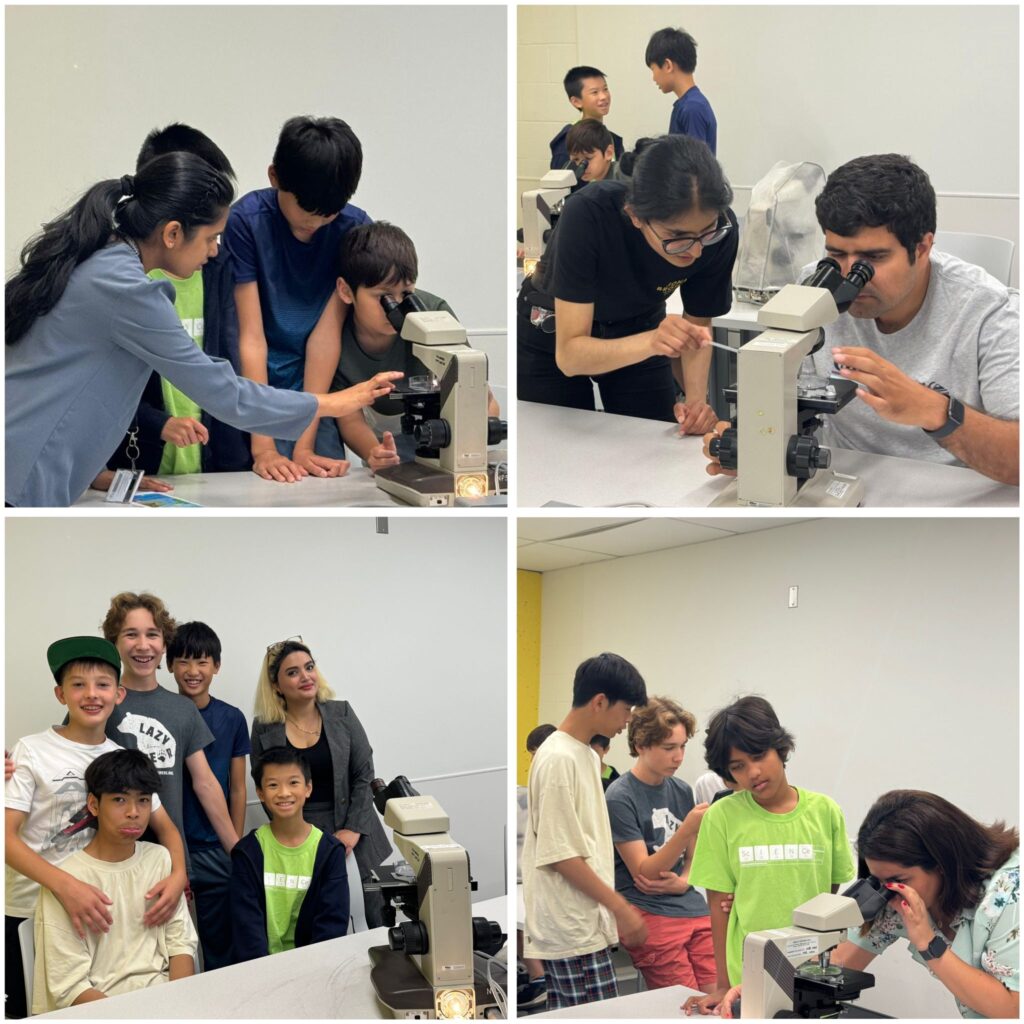
Registration: https://www.yorku.ca/cifal/waterwise-registration/
On January 31, 2025, the One WATER Institute hosted an engaging seminar featuring Prof. Alzbeta Marcek Chorvatova, an expert in cellular biophotonics. The event focused on the detection of microplastics in aquatic environments using advanced biophotonic techniques such as fluorescence microscopy, FLIM, FTIR, and Raman spectroscopy. Attendees had the opportunity to engage in insightful conversations and explore interdisciplinary approaches to tackling microplastic pollution. The event concluded with networking and refreshments, providing a platform for knowledge-sharing and collaboration. Here are some highlights from the session!



On February 4th, the One WATER Student Chapter hosted an exclusive Tour of Toys: Part 1, an exciting exploration of York University’s state-of-the-art water labs. Led by Student Chapter President, Brian Waters, the event provided students with a behind-the-scenes look at cutting-edge water research and advanced laboratory equipment.
Participants engaged in insightful discussions with researchers, gaining firsthand experience of how water quality, treatment, and sustainability are studied. The tour included interactive demonstrations, opportunities to ask questions, and valuable networking with fellow students and faculty members.
The event was a great success, sparking curiosity and enthusiasm for water science among attendees. Stay tuned for Part 2 of the Tour of Toys, where we continue our deep dive into the world of water research at York!



On February 25, 2025, the One WATER Institute hosted a compelling seminar featuring Caroline Duncan, a final-year PhD candidate under the supervision of Dr. Stephanie Gora at the Lassonde School of Engineering. Caroline shared insights from her doctoral research, which focuses on drinking water safety in Cambridge Bay, Nunavut. Her fieldwork involved extensive water quality sampling and collaborative workshops with stakeholders to identify key hazards affecting water safety in Arctic communities. The presentation highlighted crucial findings on water quality characteristics and the participatory system dynamics modeling approach she employs to optimize drinking water accessibility in remote regions.
The event attracted a diverse audience, including students, faculty members, and water industry professionals, fostering engaging discussions on the challenges of ensuring safe drinking water in cold climates. Attendees appreciated Caroline’s in-depth analysis of seasonal variations in water contaminants, the effectiveness of water filters, and policy implications for Arctic water governance. The seminar was an excellent opportunity to learn about cutting-edge research that directly impacts community well-being and sustainable water management. We extend our gratitude to Caroline for sharing her valuable insights and wish her the best in her PhD research!




The 60th Central Canadian Symposium on Water Quality Research, hosted at Toronto Metropolitan University on February 23-24, 2025, brought together leading experts, academics, and professionals to discuss innovative solutions and advancements in water quality research. Organized by the Canadian Association on Water Quality (CAWQ), the symposium featured a variety of sessions, including discussions on emerging contaminants, wastewater treatment innovations, stormwater management, and the role of digitalization in smart water solutions. With keynote addresses from Dr. Arthur Umble and Dr. Robert Andrews, the event provided a platform for interdisciplinary collaboration, fostering connections between university researchers, industry leaders, and policymakers to tackle Canada’s pressing water challenges.
Dr. Stephanie Gora, a co-chair of the symposium, played a crucial role in organizing and leading sessions, ensuring a well-structured program that addressed key water quality issues. She also chaired technical discussions, contributing her expertise to the advancement of research in the field. Meanwhile, Dr. Satinder Brar, Director of the One WATER Institute, also served as a session chair, leading discussions on wastewater as a resource for water, energy, and nutrients. Her session focused on sustainable wastewater management and innovative reuse strategies, highlighting the shift towards a circular economy in water systems. Additionally, Farshad Dabbaghi, the symposium coordinator, served as the chair for the highly anticipated Three-Minute Thesis (3MT) competition, where students showcased their research in concise and compelling presentations, demonstrating the next generation’s role in water quality advancements. Brian Waters, President of the Student Chapter, and Dr. Stephanie Gora led an engaging networking session on February 23 from 3:30 - 4:30 PM. The session focused on helping attendees overcome networking challenges, initiate meaningful conversations, and connect with experts beyond their specific research fields. Through interactive discussions and insights from experienced researchers, participants learned strategies to confidently engage with peers, industry professionals, and academic leaders. This session provided a valuable opportunity for students and early-career researchers to establish relationships that would continue to grow throughout the conference. Attendees also gained practical tips on effective communication, including how to craft impactful introductions and maintain professional connections beyond the event. By fostering a supportive environment, the session encouraged collaboration and knowledge-sharing among participants. The success of this initiative highlighted the importance of mentorship and professional development in shaping the future of water quality research.





York University Markham campus hosted an engaging workshop where researchers from One Water institute, CIFAL York, ADERSIM, Ducks Unlimited, and Toronto Nature Stewards showcased their latest innovations in VR, simulation, and AI-integrated technologies, demonstrating their applications in the Swan Lake Citizen Science Lab. Alongside these cutting-edge tools, The workshop also explored the theoretical foundations that drive our approach to community-driven environmental research. This initiative highlights the power of immersive technology in fostering environmental Citizenship, data-driven decision-making, and citizen engagement.



On March 27, 2025, the One WATER Institute hosted a special seminar in celebration of World Water Day, featuring two impactful presentations that brought together scientific innovation and community engagement. Dr. Stephanie Gora shared key insights from her recent critical review, “Control of Biofilms with UV Light”, exploring how ultraviolet (UV) technologies are being applied to manage biofilm formation across diverse sectors—from water infrastructure to healthcare. Her talk emphasized the need for standardized methodologies, better reporting practices, and continued interdisciplinary collaboration to move UV-based biofilm control toward real-world application.
PhD candidate Peyman Naeemi, under the supervision of Dr. Ali Asgari, presented his research on the integration of behavior change and audience engagement theories into digital media design. Using the Swan Lake Citizen Science Lab as a case study, Peyman examined how communication frameworks can be used to foster environmental citizenship and strengthen community involvement in local science initiatives. His work illustrates the powerful intersection between media innovation and environmental education.




